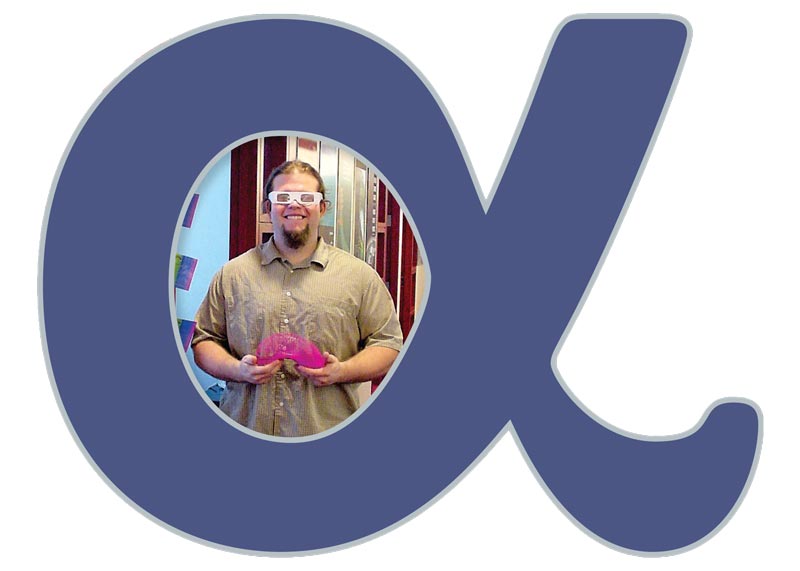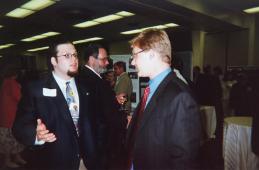Intern Alpha
Fall
2013
Special Feature
Intern Alpha
How the SPS Internship Program Was Born (and What I Learned About Communication Along the Way)
By:by Mark Lentz, 2001 SPS intern, currently a field specialist at Baker Hughes

One afternoon years ago, when I was an undergraduate working away in the physics lab, my professor Gary White called me in to his office for a chat. We had been developing educational outreach projects at Northwestern State University in Natchitoches, LA, using common household items to create optics demonstrations for inner-city elementary school children. White had taken a new job at the American Institute of Physics (AIP) just outside of Washington, DC. He asked me to join him there for a summer and explained that together we would be continuing our work and laying the foundation for an annual SPS internship program. Exactly how we would be doing this wasn’t certain. I left his office feeling excited, proud, and afraid.
In addition to helping to create the first-ever SPS Science Outreach Catalyst Kit (SOCK), I spent a significant portion of the summer building up the internship program. Gary and I visited a bunch of science-related institutions around the DC area. We were salesmen marketing SPS. At each stop, we tried to learn the goals of the institution and determine how SPS members could help achieve those goals.
My job, as I saw it, was to demonstrate that SPS interns have skills beyond their physics and math training. In my tie-dyed t-shirt, I was a geek who could speak—able to converse both in technical and in everyday situations. “You’re not what I think a mathematics and physics guy would be like,” one person told me. “I mean that in a positive way!”
Every place I visited, from the National Institute of Standards and Technology to the National Science Foundation, needed excited, active, intelligent, hard-working problem solvers with the ability to adapt and communicate. In short, they needed SPS members like you. Each institution also wanted to improve science. So our sales pitch included the idea that internships could help make SPS members better scientists by exposing them to diverse experiences.
We looked into other organizations, such as the Franklin Institute, where placements for enthusiastic educators existed. We pointed out that outreach experiences could help to transform SPS members into teachers.
Some organizations had already set up summer research opportunities for college students. We considered how an SPS internship program could complement what they were already doing.
To be honest, there were times when I was overwhelmed. But those were learning moments, situations in which it was good to be an intern able to benefit from the experiences of mentors. I remember the awesome Jack Hehn, former director of AIP’s Education Division, reminding me that whatever the outcome of a “sell,” the idea was to communicate successfully and establish relationships for the future. I took that advice with me to every meeting that followed, then and today.
 One of my favorite stops on this tour was the Rayburn House Office Building, where Hehn and I spent an evening promoting AIP to members of Congress and their staff. I remember one Congressman stopping to tell me that he had majored in physics as an undergraduate. He joined us for our full “have-atcha” pitch, shook my hand, and told me to keep up the good work! That interaction changed the course of the night; staff members suddenly took notice of us, and what followed was an evening of nonstop meetings and greetings as we showed off our display.
One of my favorite stops on this tour was the Rayburn House Office Building, where Hehn and I spent an evening promoting AIP to members of Congress and their staff. I remember one Congressman stopping to tell me that he had majored in physics as an undergraduate. He joined us for our full “have-atcha” pitch, shook my hand, and told me to keep up the good work! That interaction changed the course of the night; staff members suddenly took notice of us, and what followed was an evening of nonstop meetings and greetings as we showed off our display.
After a busy summer of wonderful experiences, surrounded by the company of many kind faces and brilliant minds, I returned to Northwestern to finish my undergraduate degree. I would go on to teach high school physics at St. Thomas More Catholic High School in Lafayette, LA, for 7 years. Now I work for Baker Hughes, where my job requires not only the physics, mathematics, and technology skills I learned in school, but also the communication skills that I acquired during that wonderful summer in DC. //
Major Brain Candy
Mark decided to major in physics just to see what it was like. While there was not one specific thing that he wanted to learn, he had been told that physics wasn’t about learning formulas and large, involved equations, but rather about how to think about situations. The intellectually stimulating conversations that he had with classmates and professors before, during, and after his classes were exactly the kind of “brain candy” he had been looking for. For more information about Mark’s experience as an SPS intern, visit his intern page at www.spsnational.org/programs/internships/2001/.
